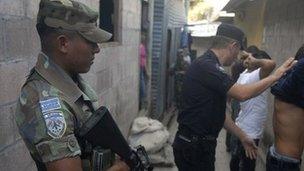Drug cartels threaten Latin American democracy - OAS
- Published

Central America has become increasingly the focus of drug gangs
Drugs gangs are posing a growing threat to democracy in Latin America, the Organization of American States (OAS) has warned.
Cartels are influencing elections by threatening politicians and even running their own candidates, OAS Secretary for Multidimensional Security Adam Blackwell said.
He was speaking at an OAS conference on transnational crime in Mexico City.
The two-day meeting brings together prosecutors from across Latin America.
Mexican President Felipe Calderon told delegates that countries in the Americas needed to work together to defeat gangs.
"In the face of transnational organised crime, we must create an international front where societies and governments are not faced with resolving this challenge alone," he said.
Mr Calderon has made the fight against Mexico's drugs cartels the central policy of his presidency.
More than 45,000 Mexicans have died in drug-related violence since 2006, when he began deploying the military to combat the cartels.
The flow of South American cocaine north to the US has also helped turn Central America into one of the most violent regions in the world, with Guatemala, Honduras and El Salvador particularly affected.
"Crime and violence are today the biggest threat to security in our region," Mr Blackwell said.
"The participation of criminal bands in the election process is another expression of the risks that organised crime poses to the preservation of our democratic organisations," he added.
Throughout Americas, Mr Blackwell said there had been 150,000 homicides in 2010.
Officials at the meeting also expressed optimism that, through co-ordinated action, criminal gangs could be successfully confronted.
- Published23 August 2011
- Published17 March 2011
- Published20 December 2010